Bahrain: Real-Estate Industry Sees Signs of Renewed Activity
Robert Jonathan Lee, CEO of Bahrain Bay
You can see that the frequency and locations are increasing weekly. Is it a massive increase? No, but you can see there is something new going on. It is that kind of anecdotal signs which show there is a renewed element of risk-taking.
Interview with Robert Jonathan Lee, CEO of Bahrain Bay
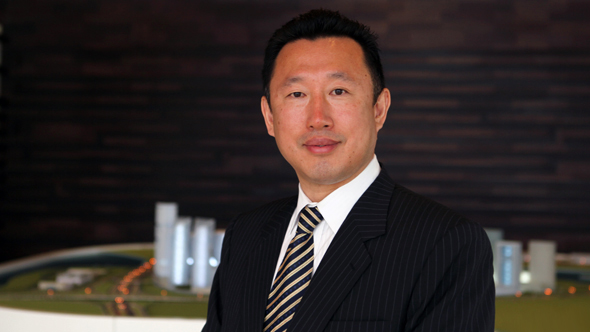
The latest statistics from the Economic Development Board (EDB) say that the loans are up by 7.7% as of November 2012. There is a renewal of activity in the real estate sector. Do you notice yourself this renewal?
Is it a massive increase? No, but you can see there is something new going on. It is that kind of anecdotal signs which show there is a renewed element of risk-taking. At the end of the day, real estate is about risk-taking and people are prepared to take the risk and make the commitments.
I think the best way to look at it is anecdotal. There’s a saying in real estate – you never take the same road twice. I drive around on weekends and see different signs and images. The first thing I see is the cranes that are moving around and the construction activity, the very basics, the holdings that are coming up. You can see that the frequency and locations are increasing weekly. Is it a massive increase? No, but you can see there is something new going on. It is that kind of anecdotal signs which show there is a renewed element of risk-taking. At the end of the day, real estate is about risk-taking and people are prepared to take the risk and make the commitments.
Looking at the macro we can see that the Eurozone is going through a crisis. A major issue is that European banks have been withdrawing liquidity from the market. Do you see financing as a major issue in Bahrain?
Financing has been and I think will continue to be an issue when it comes to the real estate companies in Bahrain and the sector because the banking industry is overburdened by what is called, and I think it comes from the US side, toxic real estate assets. I’m not saying the entire real estate sector is toxic but what’s happening is because the banks have so much exposure to the real estate sector, they are simply saying they don’t want to look at any more real estate because it’s simple to say no rather than wading through to find a good project. So they’re in simple avoidance mode and I think that will continue to happen. So unless you’re doing a development that requires a high level of equity that you already have, we expect the financing to become one of the biggest issues in 2013.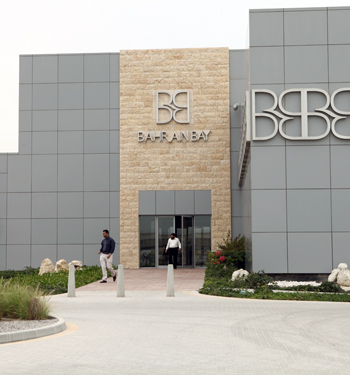
How is the industry reacting to the lack of liquidity, especially the real estate industry?
The real estate industry is simple. You try to go where the money is and right now the money is in social and affordable housing. So many people in the development industry are working with the Ministry of Housing and Ministry of Works and the various government entities that are committed to provide social housing to actually get into the social housing program. That probably will become the backbone of the construction and development industry for 2013 and maybe for the next three or four years.
What laws should be undertaken by the government to influence the situation, in particular regarding public-private partnerships (PPP)?
PPP in Bahrain is a great three letter acronym but when you actually get into it, it’s a lot more complicated than that. I was giving a speech in Hong Kong a couple months ago. There are fifty shades of grey in terms of PPP and the whole thing about who’s going to take the risk. Many in the government and many in the development industry do not see eye to eye who’s going to actually take the risk. I actually see a huge issue developing in the next while because some will be reluctant to take on the risks that the private industry bears and the private industry will be reluctant to take on the risks that government wants to take and that mismatch, I don’t think will allow too many projects to go under PPP. I think it will continue through in the traditional mode – either direct construction, direct let-out, or basically the entire private industry taking over the whole project. With the half and half of PPP, there is much to be discussed. There is quite a bit more regulation that has to become enforced. The banking industry has to come on board. It’s a marriage of parties in an unclear environment which is still reeling from the previous shocks. So I do not see too many PPP projects being announced in this coming year.
Let’s talk about Bahrain Bay. How have you weathered first the financial crisis and then the political crisis in Bahrain?
They were thinking of pure residential but maybe now they are thinking it’s more hospitality-related because Bahrain is booming in terms of hospitality and there is an apparent shortage of quality product at an affordable level.
I think you are very correct to say we have weathered the crisis. Having said that, we’ve been very fortunate to have very strong shareholders and we had a very good balance sheet where we could actually, despite all the financial difficulties, do and put all our infrastructure in together without incurring any debt. We are a debt-free company which allows us to do a lot of things that others may not be able to do. So that kind of discretion and freedom is giving us the ability to continue, and you can see our partners – Four Seasons, J W Marriott, Al Baraka Bank, Wyndham Hotels – they all have continued throughout the crisis.
Having said that, the market has changed. The traditional development cycle of providing off-land development and using those proceeds to build the construction, that has disappeared completely, not only in Bahrain but throughout the world. When that happens, the market changes and developers have to find different sources of equity and revenue to fund the construction. That solution hasn’t come about yet and you can see the impact which is a slowdown in general construction that is happening.
We are seeing many developers who have purchased land here and are asking that simple, fundamental question, the million dollar question – what do we do with our land? Many people in the beginning chose one way of doing the development and now they are actually finding a different way. Maybe a different type of product. They were thinking of pure residential but maybe now they are thinking it’s more hospitality-related because Bahrain is booming in terms of hospitality and there is an apparent shortage of quality product at an affordable level. So they are trying to change their mix and the target, and by doing that, hopefully they can get better funding from a more diverse group of investors who are willing to take the risk. We are at that stage of what I call changing the mix.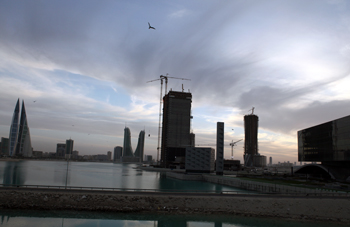
How has the fact that Arcapita is under Chapter 11 impacted Bahrain Bay?
There are three impacts of Arcapita declaring and filing for Chapter 11. Number one, we are one of the major creditors so our financial situation has changed a little because we had excess capital invested with them. Number two is what it has done in terms of overall impact and view of Bahrain and the Bahrain market because after all, Arcapita was one of the largest, most active, high-profile private equity investment banks. So people are taking a different look at Bahrain, and not just at Arcapita but overall. I think once Arcapita goes through the restructuring process, and they are just at the tail end of it now, I think there will be much more clarity and certainty. The investment market is very simple. Once there is a clarity and certainty, they come back because there has been a new benchmark set. But right now, because we are going through this uncertain flux, people will just sit back and say they want to wait until the game is over.
Arcapita was a founding shareholder and we have a board that involves Arcapita members but they represent different investors. So their Chapter 11 hasn’t had any impact on us. We’ve always had separate bank accounts and separate operations. Bahrain Bay has been an independent company from day one. So that has allowed us a substantial amount of freedom and flexibility in doing what we want to do.
Let’s talk about the stage of the project and the strategy for upcoming years.
Because the Bahrain market is going through a period of flux with what’s happening with not only the economic but the social side of things, we’ve seen many people taking a bit of a wait and see approach. I understand that but at the same time we’ve seen others who believe it’s the right time to move forward. We’ve had a lot of active discussions with various investors and developers wanting to do something about it because the valuation is at the right time. It’s all about the timing element and right now we’re seeing that the market has bottomed and people are coming back. Just like I said about the signs of constr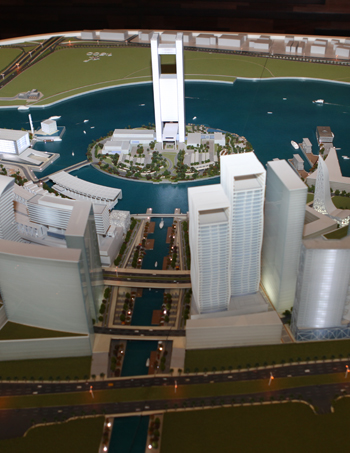 uction activities and cranes, that is coming back as well.
uction activities and cranes, that is coming back as well.
Will that translate into a flurry of activities in 2013? I certainly don’t think so. I think all those things will translate into activity in 2014, 2015 and onwards. I think 2013 is probably a year of restructuring and regrouping from everybody’s point of view.
In terms of what we are preparing to do at Bahrain Bay, we have two major developments that will be ready for opening in 2014. So we are preparing ourselves for various public areas. One of the big benefits is that the King Faisal highway that goes around the entire Bahrain Bay is open for public access. Because of this, people have discovered Bahrain Bay. It’s almost like it was the biggest secret that people would say “hey, there is something going on across the water”, but they couldn’t get to it. Now it’s open and the flyover is open and we have seen more and more people coming down.
What we’re going to do is try to liven up the waterfront area for Bahrain Bay as well as for the public. We’re going to create public places, mini parks, and things like that so people can actually enjoy the pedestrian life and the waterfront life that we’ve been developing in the last five years into small pockets.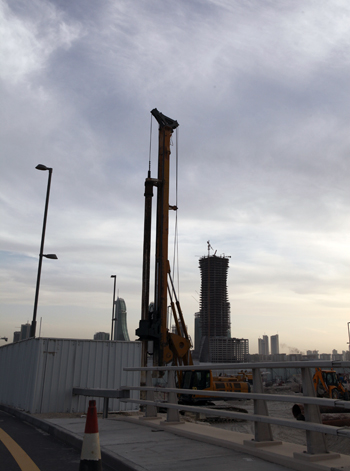
Are you still trying to sell some plots or has everything been already sold out?
We haven’t sold out yet. In terms of selling activity, that never changes but it’s more than just sales. It’s actually guiding through the development process. We have 65% of the land that’s been sold and they still need to be guided through the next phase of development.
We are helping many of our partners with what they are doing. You can sell all the land and that’s great but you actually have to decide what it is you are going to do with the land. Until you unlock that solution, you can’t move forward. If someone says they want to buy something and just sit on it, we’re not interested in those things.
We’re dealing with corporate users who might want to build a new head office maybe because the downtown, the Diplomatic Area is not right for them. It’s too congested, doesn’t have enough parking and all those types of issues that everyone knows about. They want to go into a 21st century area with a proper master plan, proper access, and all the utilities are in place. That’s why they come to us. We want to sit down and talk and provide the services they are looking for.